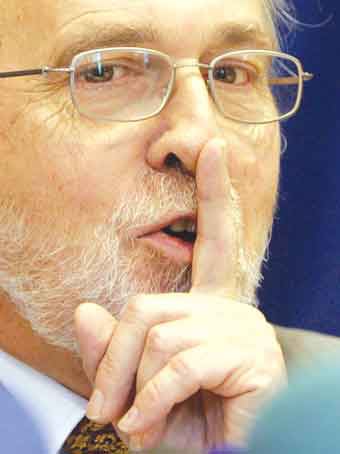 By Maarten den Heijer
By Maarten den Heijer
Anyone who regularly follows the activities of the Council of Europe will sooner or later stumble upon the name of Dick Marty. Dick Marty is a Swiss representative in the Parliamentary Assembly of the Council of Europe who is one of Europe’s frontrunners in the fight against counterterrorism strategies which compromise human rights. Although not all his reports and statements remain unchallenged, he always manages to touch the sore spot. Last year, Marty made fame with his tireless investigations into US practices of extraordinary renditions and Europe’s involvement in those practices. Although Marty was not able to prove the existence of secret prisons used by the CIA on European territory, according to Marty there were strong indications these prisons had existed – probably in Romania and/or Poland. In any event, Marty concluded that the US had created a spider’s web of clandestine detentions and transfers of terrorist suspects, which was able to spread over the European continent due to the tacit agreement or gross negligence of several European states. After it had become clear that all terrorist suspects had been transferred to the US, Marty wrote a letter to the US government, in which he requested to visit Guantanomo Bay, but this request was turned down. Apparently because Marty had indicated he wanted to speak to detainees in private. Now, Marty has found himself a new target in his war against unscrupulous counterterrorism measures. In a memorandum made public last week, Marty strongly condemns the Security Council black lists, i.e. the lists drawn up by a special Sanctions Committee in accordance with Security Council resolution 1267, on which persons or entities are placed who are considered to have links with international terrorism. Although the sanctions are non-criminal in nature – and mainly targeted at the freezing of assets and the prevention of cross-border travel – they can have drastic effects on individuals, as the case presented by Marty of a certain mr. Y makes clear. Mr. Y, a 75-year old Italian businessman of Egyptian origin who lives for more than thirty years in Switzerland, is one day included in the black list, without being informed, without having been heard and without the possibility of appeal. Although criminal charges against him are subsequently lodged, prosecution is brought to a halt once it becomes clear that evidence is lacking. Mr. Y. remains on the list however and all efforts to get him off that list are futile. Due to the sanctions, mr. Y cannot continue his small business and is unable to visit his children and grandchildren who live abroad. The problem with the Security Council black list is that it is very easy to get people on the list, but sheer impossible to get them off that list again. People can only be removed if the home country so requests and if all members of the Sanctions Committee agree. Marty observes: ‘There should also be a "de-listing procedure enabling those who consider themselves to be innocent to have their names removed from the list. Yet – and that is quite frankly an outrage – there is no such procedure." And: "It is shocking to see that an international organization whose purpose it is to affirm the principles of peace, tolerance and justice uses itself means that do not respect the fundamental principles at the base of any restriction of individual freedom in any civilized country: the right to be heard, the right to appeal, that to a fair trial, the principle of proportionality." The terrorism black lists are subject to ongoing controversy. Earlier, the European Court of First Instance (CFI) in its judgments in Yusuf and Kadi, which concerned actions for annulment against a regulation implementing the Security Council black list, noted that there was a lacuna in the judicial protection offered to those on the list, but that this lacuna was not in itself contrary to norms of jus cogens. Since SC resolutions take precedence over Community Law, the CFI held that it could only test the procedure employed by the Sanctions Committee against rules of jus cogens and not against principles of Community Law. Marty is right in his plea to improve the rules on listing and de-listing procedures applied by the Sanctions Committee. The original Committees guidelines adopted on 7 November 2002 hardly contained any safeguards. A focal point for receiving de-listing requests was only set up in December 2006 after the adoption of Resolution 1730 (2006), but the procedure is obviously still defunct.  What continues to strike me is how the war on terror has ever since 9/11 been able to justify measures which so clearly and flagrantly deny even the most basic human rights such as access to a proper court or the right to have your detention reviewed. I totally agree with Marty when he says that measures such as the blacklisting procedure not only do injustice to many persons against whom there is no proof of wrongdoing, but also challenge the credibility of the whole international fight against terrorism.
What continues to strike me is how the war on terror has ever since 9/11 been able to justify measures which so clearly and flagrantly deny even the most basic human rights such as access to a proper court or the right to have your detention reviewed. I totally agree with Marty when he says that measures such as the blacklisting procedure not only do injustice to many persons against whom there is no proof of wrongdoing, but also challenge the credibility of the whole international fight against terrorism.
